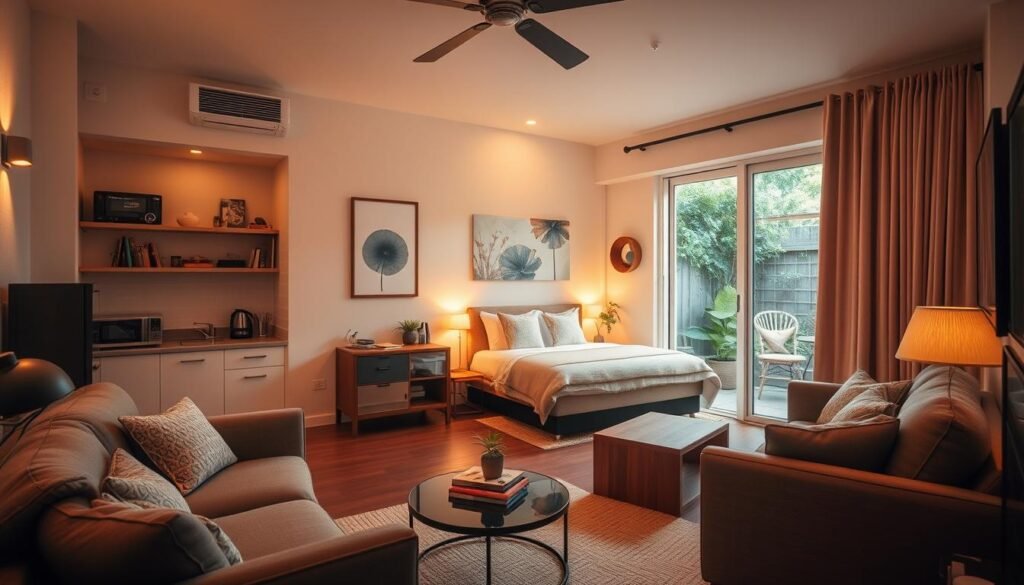Did you know that the global vacation rental market is projected to reach a staggering $113.9 billion by 2027? As a short-term rental host, this presents an incredible opportunity to capitalize on the growing demand for unique accommodations. Whether you’re managing an Airbnb property or a vacation rental on another platform, mastering the art of maximizing your rental income is crucial for long-term success.
In this comprehensive guide, we’ll explore the top 10 strategies that will help you boost your short-term rental revenue and outshine the competition. From pricing tactics to guest experience optimization, these practical tips will empower you to transform your vacation rental into a thriving and profitable business.
Key Takeaways
- Discover proven strategies to increase short-term rental income
- Learn how to effectively price your property for optimal returns
- Uncover the benefits of offering monthly discounts to attract longer-term tenants
- Explore ways to enhance your property’s appeal and online presence
- Leverage technology and data-driven insights to streamline your operations
Prepare to unlock the full potential of your vacation rental and maximize your profitability with these top 10 tips. Let’s dive in and transform your short-term rental into a financial success story!
Understanding Short-Term Rentals
In the realm of property investment strategies and passive income generation, short-term rentals have become increasingly popular in recent years. These accommodations, ranging from vacation homes and city apartments to unique and specialized lodgings, provide an attractive option for travelers seeking a more personalized and authentic experience.
Definition and Types of Short-Term Rentals
Short-term rentals refer to properties that are leased for a relatively brief period, often ranging from a single night to a few weeks. These rentals can take various forms, including:
- Vacation homes: Private residences or condos located in popular tourist destinations, offering a home-away-from-home experience for families and groups.
- City apartments: Urban dwellings that cater to business travelers, solo adventurers, and those seeking a more immersive local experience.
- Unique accommodations: Specialty properties such as treehouses, tiny homes, boats, and other distinctive offerings that provide a one-of-a-kind stay.
Popular Platforms for Listing Rentals
To facilitate the short-term rental market, several online platforms have emerged as go-to destinations for both travelers and property owners. Some of the most prominent platforms include:
- Airbnb: A leading global marketplace for vacation rentals and unique experiences.
- Vrbo (Vacation Rentals by Owner): A well-established platform specializing in family-friendly vacation rentals.
- Booking.com: A comprehensive travel booking site that also offers a wide range of short-term rental options.
These platforms provide a user-friendly interface, robust marketing tools, and a streamlined booking process, making it easier for property owners to list their units and reach a broad audience of potential guests.
“Short-term rentals offer a unique opportunity for property owners to capitalize on the growing demand for alternative accommodation options, while also providing travelers with a more authentic and personalized experience.”
Importance of Pricing Strategies
In the hospitality industry, crafting the right pricing strategy is crucial for maximizing short-term rental income. By understanding the nuances of smart pricing techniques, hosts can optimize their rates and stay competitive in the market. This section delves into the key factors to consider when setting competitive rates and navigating seasonal pricing trends.
Setting Competitive Rates
Researching the local market and analyzing competitor rates is the foundation of setting competitive prices for your short-term rental. Analyze the rates of similar properties in your area, taking into account factors like size, amenities, and location. Adjust your prices accordingly to ensure you remain attractive to potential guests without undervaluing your offering.
Understanding Seasonal Pricing Trends
Successful short-term rental hosts understand the importance of adjusting prices based on seasonal demand, events, and other market factors. Identify peak and off-peak seasons in your area, and adjust your rates accordingly. During high-demand periods, consider implementing dynamic pricing to capitalize on increased occupancy. Conversely, offer discounts or promotions during slower seasons to attract guests and maintain consistent occupancy.

By mastering smart pricing techniques, hospitality business owners can unlock the full potential of their short-term rental investments. Striking the right balance between competitive rates and seasonal adjustments is the key to maximizing rental income and achieving long-term success.
Benefits of Monthly Discounts
Offering monthly discounts for short-term rental properties can be a savvy strategy to attract longer-term tenants and boost overall occupancy rates. By incentivizing guests to stay for extended periods, property owners can enjoy more consistent and predictable rental income, ultimately contributing to their long-term increasing rental revenue and property investment strategies.
Attracting Longer-Term Tenants
Guests seeking a more extended stay often appreciate the value proposition of monthly discounts. These discounts can make longer-term rentals more accessible and appealing, encouraging them to book for a month or more. By securing longer-term bookings, property owners can reduce the time and effort spent on constant guest turnover, leading to a more stable and profitable rental business.
Increasing Occupancy Rates
Monthly discounts can also be an effective tool to boost occupancy rates, especially during slower seasons or periods when securing shorter-term bookings may be more challenging. By incentivizing guests to book for longer durations, property owners can maintain higher occupancy levels throughout the year, minimizing vacancy and maximizing their increasing rental revenue.
| Benefit | Description |
|---|---|
| Attracting Longer-Term Tenants | Monthly discounts make extended stays more appealing, leading to reduced guest turnover and more consistent rental income. |
| Increasing Occupancy Rates | Discounts encourage longer bookings, helping to maintain high occupancy levels year-round and maximize increasing rental revenue. |

“Offering a 10-15% monthly discount on our short-term rentals has significantly increased our occupancy rates and allowed us to secure more extended bookings. This has been a game-changer for our property investment strategies.”
Enhancing Property Appeal
Maximizing the appeal of your vacation rental property is crucial for attracting guests and optimizing their experience. By implementing strategic property staging techniques and leveraging high-quality photography, you can create a visually stunning and inviting environment that captivates potential renters.
Property Staging Tips
Effective property staging can make a significant difference in how guests perceive and interact with your rental. Consider the following tips to enhance your property’s visual appeal:
- Declutter and depersonalize the space, creating a clean and welcoming atmosphere.
- Arrange furniture in a way that promotes flow and functionality, making the most of the available space.
- Incorporate neutral, yet warm color schemes and accent pieces to create a cohesive and inviting ambiance.
- Highlight the property’s unique features, such as fireplaces, outdoor areas, or architectural details.
- Ensure the property is well-lit, using a combination of natural and artificial lighting to create a bright and airy feel.
Importance of Quality Photography
High-quality photography is essential for showcasing your vacation rental’s best features and enticing potential guests. Invest in professional photography services or learn to capture visually stunning images yourself. Remember, the first impression a guest has of your property often comes from the photos they see online.
| Photography Tips | Benefit to Vacation Rental Management |
|---|---|
| Use natural lighting whenever possible | Captures the property’s true ambiance and highlights its best features |
| Capture a variety of shots, including wide-angle, close-ups, and different angles | Provides a comprehensive visual representation of the rental, helping guests envision themselves in the space |
| Ensure images are high-resolution and visually appealing | Enhances the online presence and boosts guest experience optimization, leading to increased bookings |
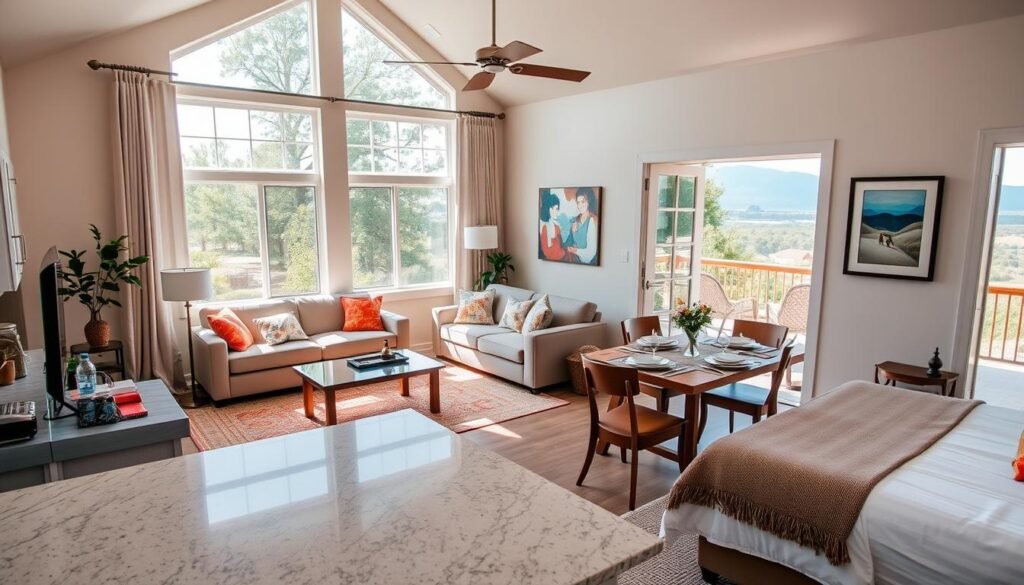
By implementing these strategies to enhance your property’s appeal and investing in high-quality photography, you can create a more compelling and inviting vacation rental experience for your guests, ultimately driving increased bookings and revenue.
Utilizing Dynamic Pricing Tools
In the world of short-term rentals, smart pricing techniques are crucial for maximizing your rental income. One powerful tool that can help you achieve this is dynamic pricing. Dynamic pricing is a strategy that automatically adjusts your rental rates based on market demand, competitor pricing, and other factors. By adopting dynamic pricing solutions, Airbnb hosts and other vacation rental providers can stay ahead of the curve and optimize their pricing for increased profitability.
How Dynamic Pricing Works
Dynamic pricing algorithms analyze a variety of data points, including historical booking patterns, seasonality, local events, and competitor pricing, to determine the optimal rate for your rental property at any given time. These tools can rapidly respond to changes in the market, enabling you to adjust your prices accordingly and ensure that your property remains competitively priced.
Popular Dynamic Pricing Solutions
- Beyond Pricing: A leading dynamic pricing platform that leverages data science and machine learning to help Airbnb hosts and other vacation rental providers optimize their rates.
- PriceLabs: An advanced dynamic pricing tool that provides detailed analytics and pricing recommendations to help you maximize your rental income.
- Wheelhouse: A comprehensive dynamic pricing and revenue management solution that integrates with various short-term rental platforms, including Airbnb, Vrbo, and Booking.com.
By incorporating dynamic pricing strategies and leveraging these powerful tools, you can stay ahead of the competition and ensure that your short-term rental property is priced competitively and profitably. Embrace the power of smart pricing techniques to unlock your Airbnb hosting potential and drive consistent revenue growth.
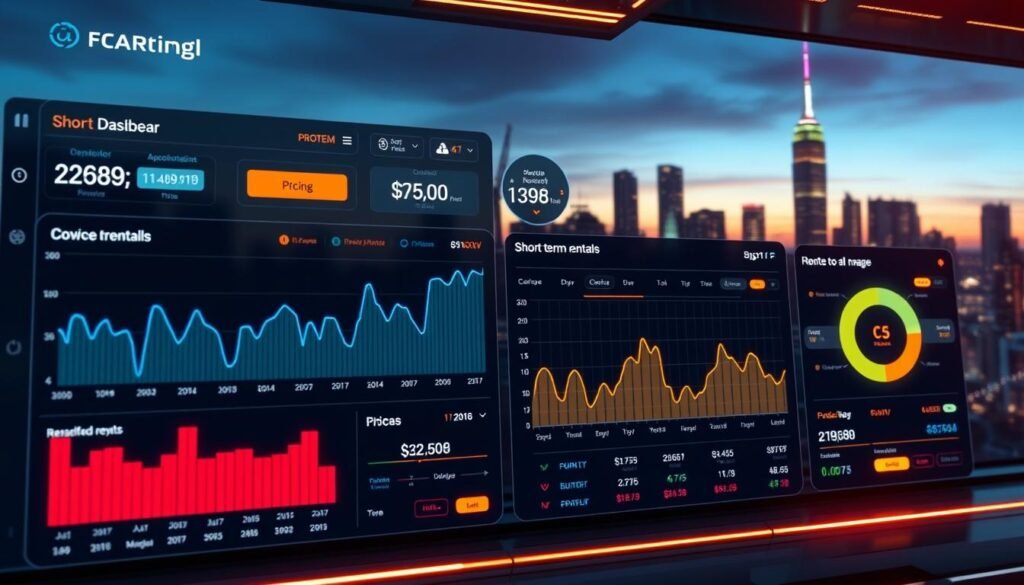
Marketing Your Short-Term Rental
Effective marketing is essential for boosting your short-term rental’s visibility and attracting a steady stream of guests. By leveraging social media platforms and implementing strategic email marketing campaigns, you can significantly increase your online presence and drive more bookings, ultimately leading to higher rental revenue.
Leveraging Social Media
Social media platforms, such as Instagram and Facebook, offer powerful tools to showcase your short-term rental and connect with potential guests. Utilize these channels to share visually appealing photos and videos of your property, highlight unique amenities, and engage with your audience. Encourage past guests to share their experiences, and consider running targeted social media ads to reach a wider audience interested in online marketing for rentals.
Email Marketing Strategies
Email marketing is a cost-effective way to maintain ongoing communication with your guests and build long-lasting relationships. Create a well-designed newsletter that showcases your property, shares updates, and offers exclusive promotions or discounts. Leverage email automation to send personalized messages, such as welcome emails, post-stay follow-ups, and seasonal offers, helping to increase rental revenue by keeping your property top of mind.
| Social Media Platform | Key Strategies |
|---|---|
| |
|

“Effective marketing is the key to standing out in the competitive short-term rental market and driving more bookings to your property.”
Building a Strong Online Presence
In the world of vacation rental management, establishing a strong online presence is essential for attracting potential guests and maximizing your short-term rental income. By creating a professional website and effectively managing your online reviews, you can build trust, enhance your property’s appeal, and ultimately drive more bookings.
Creating a Professional Website
Your website serves as the first point of contact for many potential guests. Invest in a visually appealing, user-friendly platform that showcases your rental property in the best possible light. Ensure your website is mobile-responsive, as a significant portion of travelers now use their smartphones to research and book accommodations. Leverage online marketing for rentals strategies to optimize your website’s content and structure, making it easier for prospective guests to find and navigate your property listings.
Managing Online Reviews
Online reviews play a crucial role in vacation rental management and can significantly impact your property’s perceived value and credibility. Actively monitor and respond to both positive and negative reviews, addressing any concerns or feedback in a professional and timely manner. Encourage satisfied guests to leave reviews, as these testimonials can serve as powerful social proof and help attract new bookings. Regularly analyze your review data to identify areas for improvement and ensure your rental property maintains a strong reputation online.
| Key Strategies for Building a Strong Online Presence | Benefits |
|---|---|
|
|
By investing in a professional website and actively managing your online reviews, you can establish a strong online presence that attracts more guests, builds trust, and ultimately drives the growth of your short-term rental business. Stay ahead of the competition and prioritize your digital marketing efforts to maximize your rental income. For more budget-friendly travel tips, check out this guide on A Beginner’s Guide to Traveling on a.

“A strong online presence is the foundation for a successful vacation rental business in today’s digital landscape.”
Providing Exceptional Guest Experiences
In the hospitality business, providing an exceptional guest experience is paramount. Effective communication and a comprehensive welcome guide can make all the difference in delighting your short-term rental guests and encouraging positive reviews and repeat bookings. Guest experience optimization should be a top priority for any successful hospitality business tips.
Importance of Communication
Clear and responsive communication is the foundation of creating a memorable guest experience. Promptly address any inquiries or concerns, and maintain a friendly, professional tone throughout your interactions. Anticipate your guests’ needs and offer proactive solutions to make their stay as seamless and enjoyable as possible.
Creating a Welcome Guide
Develop a detailed welcome guide that provides your guests with all the information they need for their stay. This guide should cover practical details such as check-in/check-out procedures, Wi-Fi access, and emergency contacts, as well as recommendations for local attractions, dining, and entertainment. A well-crafted welcome guide can enhance the guest experience and foster a sense of hospitality from the moment they arrive.

“Treating guests as friends and providing personalized service can transform a good stay into an exceptional one.”
- Establish clear communication channels for guests to reach you
- Anticipate common questions and address them in your welcome guide
- Offer recommendations for local experiences to enrich your guests’ stay
- Respond promptly to any inquiries or concerns from your guests
- Go the extra mile to make your guests feel valued and appreciated
By prioritizing guest experience optimization and implementing effective hospitality business tips, you can create a lasting impression and encourage loyal, satisfied guests who will not only return but also spread positive word-of-mouth about your short-term rental property.
Using Technology to Improve Operations
In the fast-paced world of vacation rental management, embracing the power of technology can significantly streamline your operations and enhance the guest experience. From smart home devices to specialized property management software, the right technological solutions can help you optimize your vacation rental business and boost your property investment strategies.
Smart Home Devices for Elevated Guest Experiences
Integrating smart home technology into your vacation rentals can elevate the guest experience and simplify property management. Consider installing devices such as smart locks, thermostats, and lighting systems that allow remote access and control. These features not only provide added convenience for your guests but also help you monitor and manage your properties more efficiently, ultimately enhancing your overall vacation rental management efforts.
Leveraging Property Management Software
Adopting a robust property management software solution can be a game-changer for your vacation rental business. These platforms offer a wide range of features, from automated booking and payment processing to maintenance scheduling and guest communication tools. By streamlining administrative tasks, property management software can help you save time, reduce the risk of errors, and focus on delivering exceptional guest experiences, all while optimizing your property investment strategies.
| Feature | Benefit |
|---|---|
| Automated Booking and Payment | Effortless management of reservations and financial transactions |
| Maintenance Scheduling | Proactive upkeep of your properties to ensure guest satisfaction |
| Guest Communication Tools | Seamless interaction with guests before, during, and after their stays |
By embracing the power of technology, vacation rental managers can streamline their operations, enhance the guest experience, and ultimately drive growth in their property investment strategies. Leveraging smart home devices and property management software can be a game-changer in the competitive vacation rental market.
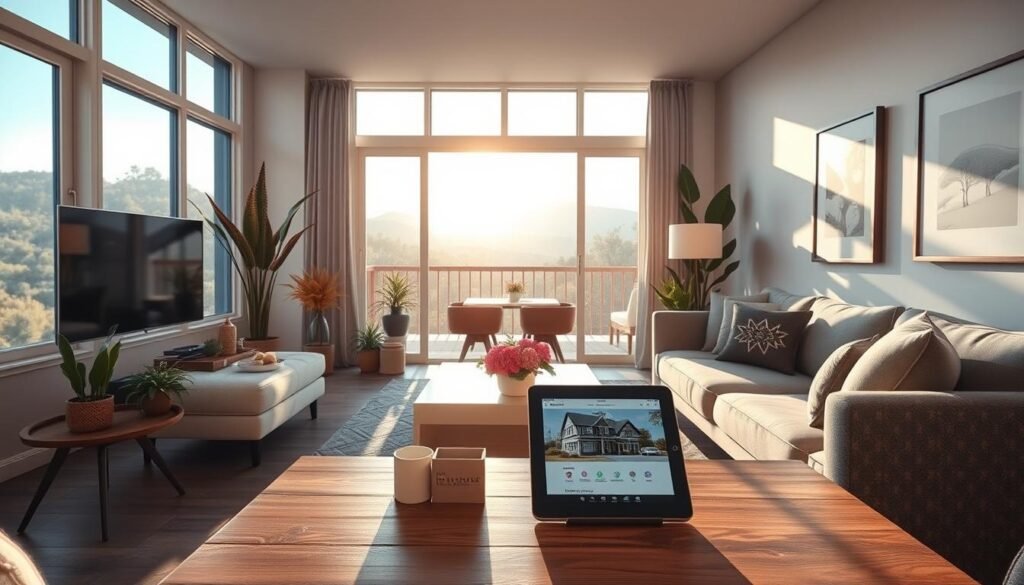
Networking with Other Hosts
As an Airbnb host, networking with other short-term rental providers can be a game-changer for your hospitality business. By joining local Airbnb hosting communities, you can gain valuable insights, share best practices, and even collaborate on mutually beneficial initiatives.
Joining Local Host Communities
Seek out and connect with other Airbnb hosts in your local area. These host communities can provide a wealth of knowledge and support, from navigating regulations to optimizing your property listings. Attend meetups, join online forums, or reach out to local host associations to build meaningful relationships with your peers.
Collaborating with Other Rentals
Consider partnering with complementary short-term rental properties in your area. This could involve cross-promoting each other’s listings, offering joint packages or discounts, or even coordinating your cleaning and maintenance schedules. By working together, you can enhance the guest experience, increase visibility, and potentially boost your hospitality business revenue.
Networking with other hosts is a powerful way to stay informed, expand your expertise, and unlock new opportunities in the dynamic world of Airbnb hosting. Embrace the power of collaboration and community to maximize your short-term rental success.
| Benefits of Networking with Other Airbnb Hosts | Examples of Collaborative Opportunities |
|---|---|
|
|
“Networking with other short-term rental hosts is crucial for staying ahead of industry trends and discovering new opportunities to grow your business.”
– Jane Doe, Experienced Airbnb Superhost
Legal Considerations for Short-Term Rentals
Navigating the legal landscape of the property investment strategies and vacation rental management industry can be a complex endeavor. Before diving into the world of short-term rentals, it’s crucial to understand the local regulations and obtain the necessary licenses and permits to operate your rental business legally.
Understanding Local Regulations
One of the primary considerations for short-term rental hosts is familiarizing themselves with the zoning laws and regulations in their area. Many cities and municipalities have specific guidelines and restrictions on the operation of vacation rentals, including the number of days a property can be rented, the type of properties that are eligible, and any required permits or licenses. Failing to comply with these regulations can result in hefty fines and potential legal issues.
Proper Licensing and Permits
Obtaining the necessary licenses and permits is a crucial step in the process of operating a legal short-term rental. Depending on the location, hosts may need to acquire a business license, a vacation rental permit, or even a specialized short-term rental license. It’s essential to research the specific requirements in your area and ensure that all necessary paperwork is in order before listing your property.
| Regulation | Description | Example |
|---|---|---|
| Zoning Laws | Restrictions on the type of properties that can be used for short-term rentals | Some areas may only allow vacation rentals in certain zoning districts, such as commercial or mixed-use zones. |
| Licensing Requirements | Permits or licenses needed to operate a short-term rental business | A city may require a vacation rental permit or a business license specifically for short-term rental properties. |
| Occupancy Limits | Restrictions on the maximum number of guests allowed in a short-term rental | Some municipalities may limit the number of guests based on the size of the property or the number of bedrooms. |
By familiarizing themselves with the local regulations and obtaining the proper licenses and permits, short-term rental hosts can ensure they are operating their properties within the legal boundaries and avoid potential fines or legal issues down the line.

Strategies for Guest Retention
In the competitive short-term rental market, retaining guests is crucial for increasing rental revenue and optimizing the guest experience. By implementing effective strategies, hosts can cultivate lasting relationships with their visitors and encourage repeat bookings. Two key approaches to consider are offering loyalty programs and providing personalized guest services.
Offering Loyalty Programs
Establishing a well-designed loyalty program can be an excellent way to incentivize guests to book with you again. This could involve offering rewards points for each stay, which can be redeemed for discounts on future bookings or other exclusive perks. Alternatively, you might consider a punch card system, where guests receive a free night after a certain number of paid stays. Loyalty programs not only encourage repeat business but also foster a sense of community and customer, leading to increased rental revenue and enhanced guest experience optimization.
Personalized Guest Services
Going the extra mile to provide personalized services can make a significant difference in guest satisfaction and retention. This could involve greeting guests with a welcome basket filled with local treats, offering detailed recommendations for area attractions and dining, or arranging for additional amenities like in-unit spa services or private chef experiences. By anticipating and catering to the unique needs and preferences of your guests, you can create an unforgettable experience that keeps them coming back.
“Personalized guest services are the key to building long-lasting relationships with your short-term rental guests. The small details make all the difference in creating a memorable experience.”
Incorporating these strategies for guest retention can have a profound impact on your short-term rental business, driving increasing rental revenue and optimizing the guest experience optimization. By fostering loyalty and providing exceptional personalized services, you can establish a loyal customer base and position your rental as a premier choice in the market.
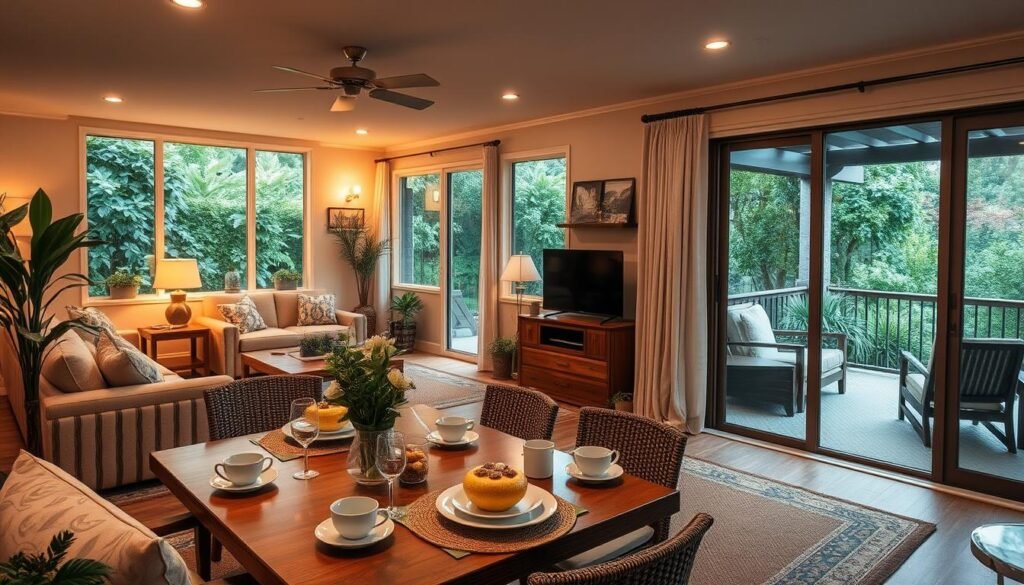
Effective Cleaning and Maintenance Practices
Maintaining a clean and well-kept property is crucial for vacation rental management and optimizing the guest experience. By implementing effective cleaning and regular maintenance practices, you can ensure your short-term rental stays in top condition, leaving a lasting positive impression on your visitors.
Hiring Professional Cleaning Services
Investing in professional cleaning services can be a game-changer for your vacation rental business. Trained cleaning crews have the expertise and equipment to thoroughly clean and sanitize your property, leaving it sparkling and ready for the next guests. This not only enhances the overall appearance of your rental but also helps meet the high expectations of today’s discerning travelers seeking a premium guest experience.
Regular Property Maintenance Tips
Alongside professional cleaning, regular property maintenance is essential for preserving the condition of your vacation rental. This includes tasks such as:
- Conducting routine inspections and addressing any issues promptly
- Maintaining the landscaping and ensuring the exterior is well-kept
- Performing regular checks on appliances, plumbing, and electrical systems
- Addressing any necessary repairs or replacements in a timely manner
By staying on top of these maintenance tasks, you can extend the lifespan of your property, reduce the risk of costly repairs, and provide a safer, more enjoyable experience for your guests.
Effective cleaning and maintenance practices are essential for vacation rental management and guest experience optimization. By investing in professional cleaning services and implementing a regular maintenance routine, you can ensure your property remains in top condition, maximizing your rental income and fostering repeat bookings from satisfied guests.

| Service | Frequency | Benefits |
|---|---|---|
| Professional Cleaning | After each guest stay | Ensures a clean and sanitized environment, meeting guest expectations |
| Landscaping Maintenance | Monthly or bi-weekly | Maintains the curb appeal and outdoor aesthetics of the property |
| Appliance Inspection | Quarterly | Identifies and addresses any issues, preventing breakdowns and improving efficiency |
| Plumbing and Electrical Checks | Bi-annually | Ensures the property’s systems are functioning properly and safely |
Analyzing Performance Metrics
Unlocking the secrets to maximizing your short-term rental income starts with a deep dive into your performance metrics. By closely tracking and analyzing key indicators, you can uncover valuable insights to refine your pricing strategies and drive increased rental revenue.
Key Performance Indicators for Rentals
To get a clear picture of your rental business’s health, focus on these essential performance metrics:
- Occupancy Rates: Monitor the percentage of time your property is booked and occupied to identify peak seasons and optimize pricing.
- Average Daily Rate (ADR): Track the average price you charge per night to ensure you’re staying competitive and implementing smart pricing techniques.
- Revenue Per Available Room (RevPAR): This metric combines occupancy and ADR, giving you a holistic view of your property’s earning potential.
- Guest Satisfaction Scores: Closely monitor reviews and ratings to maintain a high-quality guest experience and build a positive reputation.
Utilizing Data Analytics Tools
Simplify the process of tracking and analyzing your performance metrics with the help of data analytics tools. These powerful platforms can provide real-time insights, personalized recommendations, and in-depth reporting to guide your decision-making and boost your rental revenue.
Some popular data analytics solutions for short-term rentals include AirDNA, AllTheRooms, and Transparent. These tools can help you identify pricing sweet spots, optimize your listings, and stay ahead of market trends to remain competitive.

“Leveraging data analytics is key to unlocking the full potential of your short-term rental business. These tools can provide the insights you need to make informed decisions and maximize your earning potential.”
Adapting to Market Trends
In the dynamic world of property investment, successful short-term rental owners must stay attuned to the ever-evolving market trends. By staying informed on industry changes and exploring new market opportunities, you can position your rental business for long-term growth and passive income generation.
Staying Informed on Industry Changes
Keeping a pulse on the short-term rental industry is crucial for adapting your property investment strategies. Follow industry publications, attend relevant conferences, and engage with other hosts to stay ahead of the curve. This allows you to anticipate shifts in traveler preferences, regulatory updates, and technological advancements that could impact your rentals.
Exploring New Market Opportunities
As the short-term rental landscape evolves, be proactive in identifying emerging markets and diversifying your rental portfolio. Research up-and-coming destinations, monitor trends in alternative accommodation types, and consider expanding into adjacent sectors, such as corporate housing or vacation rentals. By continuously exploring new opportunities, you can generate passive income and capitalize on the ever-changing dynamics of the industry.
| Adapting to Market Trends | Key Strategies |
|---|---|
| Staying Informed on Industry Changes |
|
| Exploring New Market Opportunities |
|
“Successful short-term rental owners must be nimble and adaptable to capitalize on the ever-changing dynamics of the industry.”
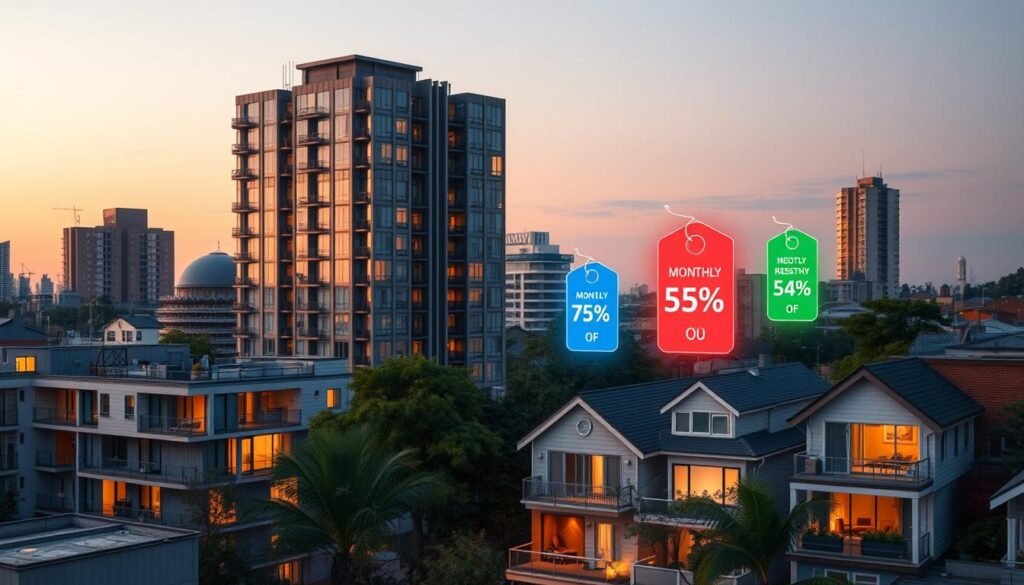
By embracing a forward-thinking mindset and proactively adapting to market trends, property investment strategies can unlock new opportunities for passive income generation and long-term growth in the short-term rental industry.
Planning for the Off-Season
As a vacation rental manager, navigating the off-season can be a challenge, but with the right strategies, you can maintain a steady stream of income and keep your property occupied. Key to this is understanding the importance of promotional tactics and flexible cancellation policies.
Promotional Strategies for Slow Periods
During the off-season, when demand for vacation rentals tends to dip, it’s crucial to employ creative promotional techniques to attract bookings. Some effective strategies include:
- Offering discounted rates for longer stays or weekends
- Promoting seasonal activities and events in the local area
- Partnering with local businesses to create bundled packages
- Launching targeted social media campaigns and email marketing initiatives
Creating Flexible Cancellation Policies
In addition to promotional efforts, flexible cancellation policies can be a powerful tool in your vacation rental management arsenal. By offering guests the option to easily modify or cancel their bookings, you can provide a sense of security and increase the likelihood of securing reservations during the off-season.
Implementing smart pricing techniques and strategizing for the slow periods can help you maintain a steady flow of income and keep your property occupied year-round. Embracing the off-season as an opportunity to get creative and cater to your guests’ needs can be the key to maximizing your rental’s profitability.

Conclusion: Maximizing Your Rental Income
In this comprehensive guide, we’ve explored a wealth of strategies to help you maximize your short-term rental income. From understanding the importance of competitive pricing to leveraging dynamic pricing tools, creating a strong online presence, and providing exceptional guest experiences, we’ve covered the key elements that can propel your vacation rental business to new heights.
Recap of Key Strategies
By implementing the top 10 tips outlined in this article, you’ll be well on your way to generating a steady stream of passive income from your short-term rental. Remember to stay attuned to market trends, adapt to changing guest preferences, and continually optimize your pricing and marketing efforts to maintain a competitive edge.
Encouragement to Take Action
The path to maximizing your short-term rental income may seem daunting at first, but with the right tools and a strategic mindset, you can unlock the full potential of your vacation rental. Take the plunge, put these strategies into practice, and watch your rental income soar. Your success is within reach – all it takes is the courage to take that first step.
FAQ
What are the most effective strategies for maximizing short-term rental income?
The top strategies for maximizing short-term rental income include setting competitive pricing, offering monthly discounts, enhancing property appeal, utilizing dynamic pricing tools, effective marketing, providing exceptional guest experiences, and leveraging technology to improve operations.
How can I set competitive rental rates for my property?
To set competitive rental rates, you should research local market trends, analyze competitor pricing, and adjust your rates based on factors like seasonality, events, and occupancy rates. Dynamic pricing tools can also help you optimize your rates based on market demand.
What are the benefits of offering monthly discounts for short-term rentals?
Offering monthly discounts can help attract longer-term guests, reduce turnover, and increase overall occupancy rates, leading to more stable and predictable income. This strategy can also make your rental more attractive to potential guests seeking extended stays.
How can I enhance the appeal of my short-term rental property?
Effective strategies for enhancing property appeal include professional staging, high-quality photography, and creating a welcoming ambiance. Paying attention to details like decor, amenities, and cleanliness can significantly improve your rental’s attractiveness to guests.
What are the key considerations for marketing my short-term rental effectively?
Effective marketing strategies for short-term rentals include leveraging social media platforms, implementing email marketing campaigns, maintaining a professional website, and actively managing online reviews. These tactics can help you reach a wider audience and build a strong online presence.
How can I provide exceptional guest experiences to encourage repeat bookings?
Providing exceptional guest experiences involves effective communication, creating a comprehensive welcome guide, and leveraging technology to enhance the guest experience. Paying attention to guest needs, responding promptly to inquiries, and going the extra mile can lead to positive reviews and repeat bookings.
What legal considerations should I keep in mind when operating a short-term rental?
It’s important to understand and comply with local regulations, zoning laws, and licensing requirements for short-term rentals in your area. Failure to do so can result in fines or even the inability to operate your rental business legally.
How can I analyze the performance of my short-term rental and make data-driven decisions?
Tracking key performance indicators, such as occupancy rates, average daily rates, and revenue, and utilizing data analytics tools can provide valuable insights to help you make informed decisions about pricing, marketing, and operational strategies.
How can I adapt my short-term rental business to market trends and changes?
Staying informed about industry trends, exploring new market opportunities, and being flexible in your approach can help you adapt to changes in the short-term rental market. This may involve diversifying your rental portfolio, adjusting pricing and marketing tactics, or exploring new revenue streams.
How can I maintain income during the off-season for my short-term rental?
Effective strategies for maintaining income during off-peak seasons include implementing promotional tactics, offering flexible cancellation policies, and exploring opportunities for longer-term bookings. Adapting your pricing and marketing strategies can help you attract guests and maintain a stable revenue stream throughout the year.

